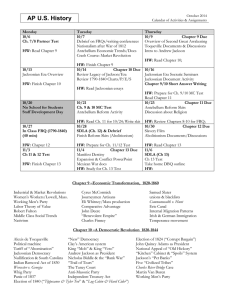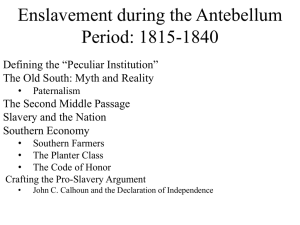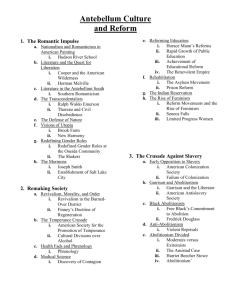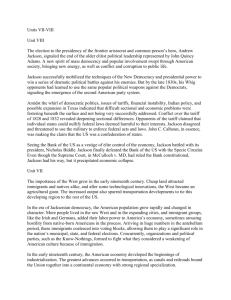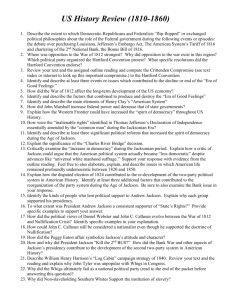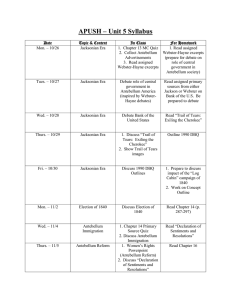Short Answer Question canceled for 10/8
advertisement
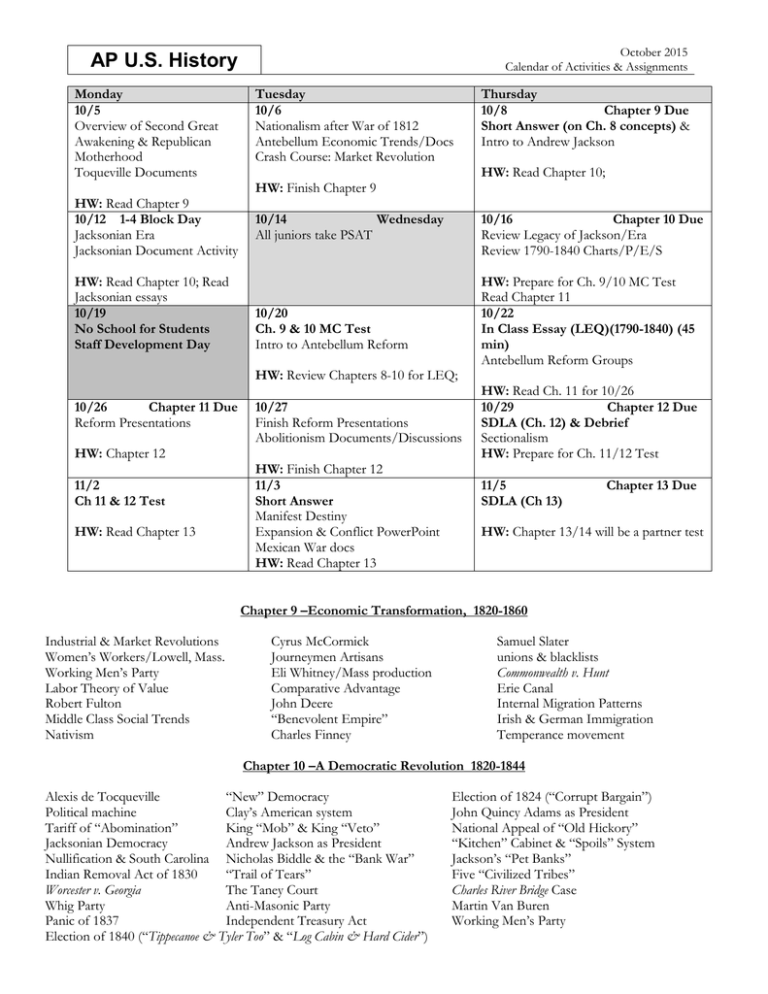
October 2015 Calendar of Activities & Assignments AP U.S. History Monday 10/5 Overview of Second Great Awakening & Republican Motherhood Toqueville Documents HW: Read Chapter 9 10/12 1-4 Block Day Jacksonian Era Jacksonian Document Activity HW: Read Chapter 10; Read Jacksonian essays 10/19 No School for Students Staff Development Day Tuesday 10/6 Nationalism after War of 1812 Antebellum Economic Trends/Docs Crash Course: Market Revolution HW: Finish Chapter 9 10/14 Wednesday All juniors take PSAT HW: Chapter 12 11/2 Ch 11 & 12 Test 10/20 Ch. 9 & 10 MC Test Intro to Antebellum Reform HW: Read Chapter 13 10/27 Finish Reform Presentations Abolitionism Documents/Discussions HW: Finish Chapter 12 11/3 Short Answer Manifest Destiny Expansion & Conflict PowerPoint Mexican War docs HW: Read Chapter 13 HW: Read Chapter 10; 10/16 Chapter 10 Due Review Legacy of Jackson/Era Review 1790-1840 Charts/P/E/S HW: Review Chapters 8-10 for LEQ; 10/26 Chapter 11 Due Reform Presentations Thursday 10/8 Chapter 9 Due Short Answer (on Ch. 8 concepts) & Intro to Andrew Jackson HW: Prepare for Ch. 9/10 MC Test Read Chapter 11 10/22 In Class Essay (LEQ)(1790-1840) (45 min) Antebellum Reform Groups HW: Read Ch. 11 for 10/26 10/29 Chapter 12 Due SDLA (Ch. 12) & Debrief Sectionalism HW: Prepare for Ch. 11/12 Test 11/5 SDLA (Ch 13) Chapter 13 Due HW: Chapter 13/14 will be a partner test Chapter 9 –Economic Transformation, 1820-1860 Industrial & Market Revolutions Women’s Workers/Lowell, Mass. Working Men’s Party Labor Theory of Value Robert Fulton Middle Class Social Trends Nativism Cyrus McCormick Journeymen Artisans Eli Whitney/Mass production Comparative Advantage John Deere “Benevolent Empire” Charles Finney Samuel Slater unions & blacklists Commonwealth v. Hunt Erie Canal Internal Migration Patterns Irish & German Immigration Temperance movement Chapter 10 –A Democratic Revolution 1820-1844 Alexis de Tocqueville “New” Democracy Political machine Clay’s American system Tariff of “Abomination” King “Mob” & King “Veto” Jacksonian Democracy Andrew Jackson as President Nullification & South Carolina Nicholas Biddle & the “Bank War” Indian Removal Act of 1830 “Trail of Tears” Worcester v. Georgia The Taney Court Whig Party Anti-Masonic Party Panic of 1837 Independent Treasury Act Election of 1840 (“Tippecanoe & Tyler Too” & “Log Cabin & Hard Cider”) Election of 1824 (“Corrupt Bargain”) John Quincy Adams as President National Appeal of “Old Hickory” “Kitchen” Cabinet & “Spoils” System Jackson’s “Pet Banks” Five “Civilized Tribes” Charles River Bridge Case Martin Van Buren Working Men’s Party Chapter 11: Antebellum Religion & Reform, 1820-1860 For this chapter, you will be assigned to a specific reform group. Skim p.331-344 and read the sections on Abolitionism and the Women’s Movement more carefully. Second Great Awakening Ralph Waldo Emerson Henry David Thoreau Herman Melville Nativism Lloyd Garrison “Gag” Rule Dorothea Dix Sojourner Truth George Whitefield Transcendentalism Walt Whitman Utopian Communities Abolitionist Strategies Grimké Sisters American Anti-Slavery Society Horace Mann Seneca Falls Convention Benevolence/Good Works Temperance movement Nathaniel Hawthorne Mormons Nat Turner’s Rebellion William Underground Railroad separate spheres Harriet Beecher Stowe Elizabeth Cady Stanton Chapter 12: The South Expands: Slavery & Society, 1800-1860 This is a thematic chapter on slavery. Focus on the larger themes and trends and pay attention to how the institution of slavery and the experience of slaves changes over time. Internal Slave Trade Slave Marriage trends Southern Defenses of Slavery Small planters/yeomen Demographics on slave ownership Regional economic differences Forms of slave resistance King Cotton Old South gentry culture Planter elite/aristocracy property-less whites Texas annexation Black P rotestantism Northern Free Black Society Social Impacts on Slaves Slave-holding trends “necessary evil”/“positive good” gang-labor system Southern Economic Division Origins of African American culture Southern Free Black Society Chapter 13: Expansion, War, & Sectional Crisis: 1844-1860 Manifest Destiny “54° 40” or Fight!” Mexican-American War Wilmot Proviso Popular Sovereignty Compromise of 1850 Kansas-Nebraska Act Dred Scott v. Sanford John Brown & Raid at Harper’s Ferry Oregon Fever James Polk Zachary Taylor Treaty of Guadalupe Hidalgo California Gold Rush Fugitive Slave Act & Personal Liberty Laws Creation of Republican Party Stephen Douglas & Freeport Doctrine Abraham Lincoln Plains Indian Lifestyle Election of 1844 “conscience” Whigs “Free Soil” Party “higher law”/”fire eaters” Gadsden Purchase “Bleeding” Kansas James Buchanan Election of 1860
